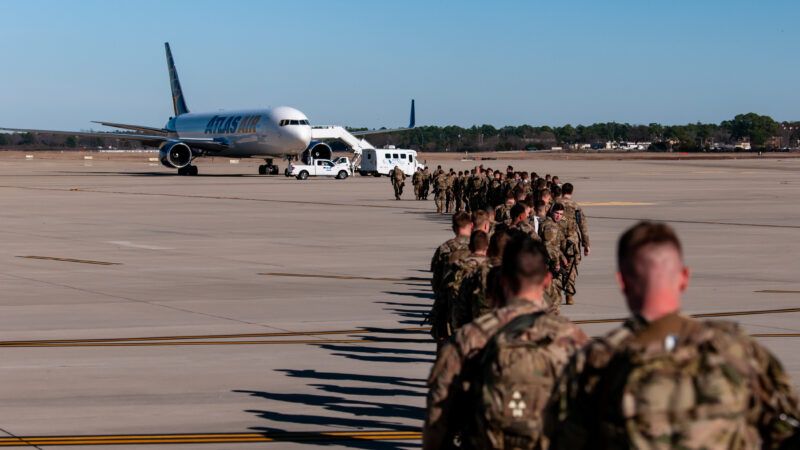Airstrikes Against U.S. Troops in Iraq Highlight Dangers of Our Presence in the Middle East
Keeping American boots on the ground means keeping them in harm's way.

On Monday, rockets struck Ayn al-Asad air base, a military facility in Iraq that hosts American troops. U.S. Army Colonel Wayne Marotto, a spokesman for the U.S.-led coalition in Iraq, tweeted that the attack did not result in casualties. No group immediately claimed responsibility for the action.
Even without human loss, Monday's hostilities highlight the risks associated with a continued U.S. troop presence and ongoing military engagement in the Middle East. The attack came just one week after President Joe Biden's June 27 airstrikes on facilities used by Iran-backed militias in Iraq and Syria, which prompted rocket attacks against U.S. troops in Syria the very next day. There have been many tit-for-tat exchanges between the U.S. and Iran-linked parties since former President Donald Trump ordered the assassination of Iranian General Qasem Soleimani in January 2020. Though it's unclear who ordered the Monday attack, it is clear that U.S. strikes and troops have failed to deter further antagonism from hostile parties in the region.
While Biden has made the Afghanistan troop withdrawal a centerpiece of his presidential agenda, his plans for the U.S. presence in Iraq and elsewhere in the Middle East are far vaguer. Following the Soleimani assassination on Iraqi soil, the Iraqi Parliament passed a resolution to expel U.S. troops from the country. No timetable for that withdrawal has emerged during bilateral negotiations, however, leaving the fate of the roughly 3,500 remaining U.S. troops in Iraq unsettled. Roughly 900 are still in Syria and their future is similarly murky.
That leaves ample targets for hostile parties throughout the Middle East, even though the reasons behind a continued troop presence in the two countries are questionable. The main goals for recent U.S. activities in Iraq and Syria—to defeat ISIS and help those nations reclaim seized territory—have largely been accomplished. Given current tensions in the Middle East, keeping American boots on the ground means keeping them in harm's way in order to achieve ill-defined ends.
While justifying the February strike in Syria, Biden claimed the action was "pursuant to the United States' inherent right of self-defense." Democrats in Congress questioned that line of reasoning and pointed out the lack of a congressional authorization for the use of military force in Syria (though previous resolutions authorize such presidential actions in Iraq and Afghanistan). Sen. Tim Kaine (D–Va.) called the attack "not constitutional" given Biden's lack of communication with Congress. Rep. Ro Khanna (D–Calif.) agreed and criticized Biden for carrying out a strike that was "not in self-defense against an imminent threat."
Biden's June strikes received similar scrutiny. They reignited debate over presidential war powers, spurring the House to vote to repeal several military force authorizations. That resistance is making it increasingly difficult for the president to justify the dubious constitutionality of strikes, unnecessary escalation of tensions, and endangering the lives of Americans stationed in the Middle East.
As he announced the U.S. withdrawal from Afghanistan, Biden questioned the sensibility of delaying the troop departure further at the expense of even more lives lost. He invoked "the living cost of war" shown in American deaths, saying, "Every one of those dead are sacred human beings who left behind entire families. An exact accounting of every single solitary one needs to be had."
They are indeed sacred, and Biden is right to ask why he should pass the responsibility of the war in Afghanistan to yet another presidential administration. He should take that logic a step further and realize that his concern about the safety of American troops is contradicted by the U.S. presence and actions elsewhere in the Middle East. Though the Monday strike did not result in American deaths or injuries, U.S. forces may not prove so lucky next time.


Show Comments (46)